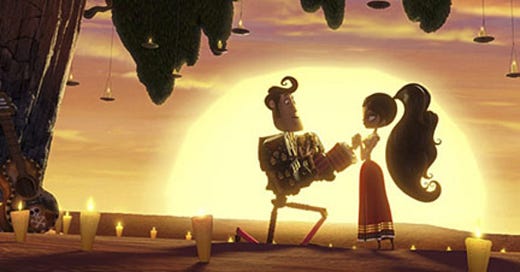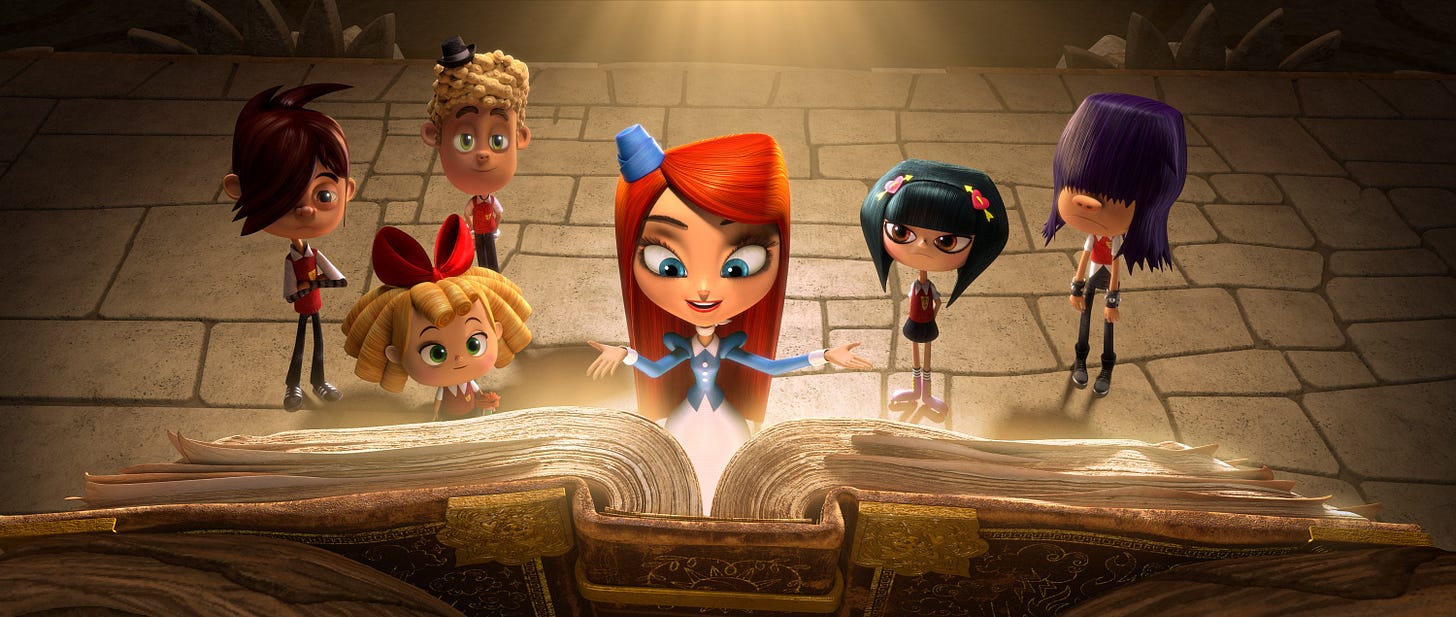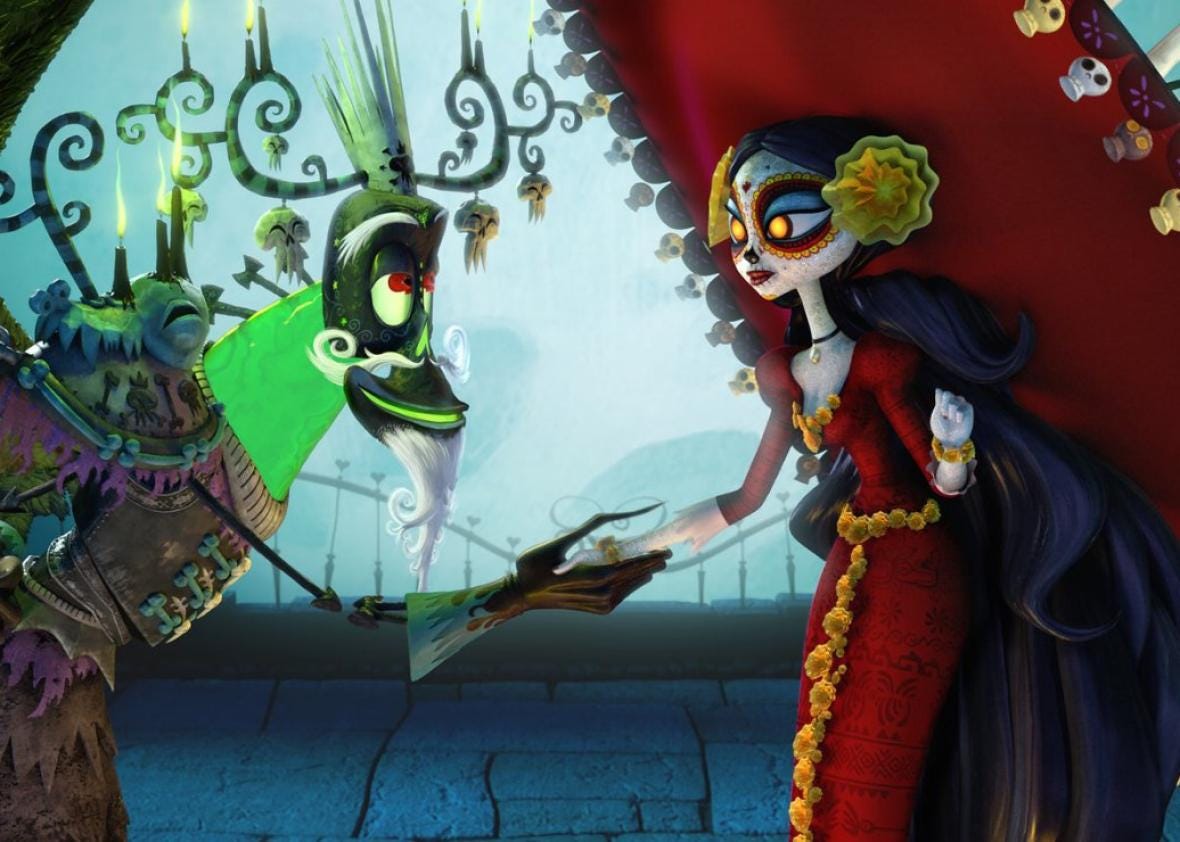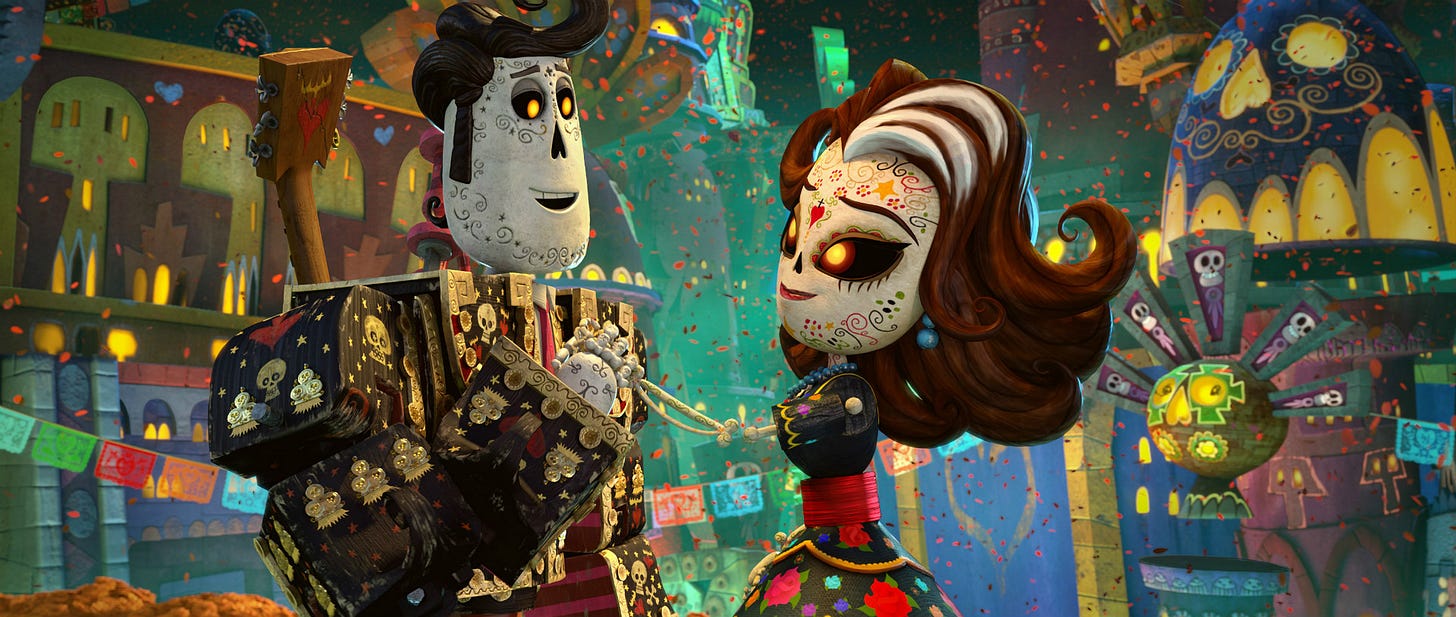Well, if your kids want “Coco”, but you have “Coco” at home, then here is “The Book Of Life”. Formerly known as the slightly more accurate, but more morbid “Day Of The Dead”, this animated feature has more than a few parallels to that Pixar favorite. Jorge R. Gutierrez developed, co-wrote and directed this movie after years of development, boosted over the finish line by the involvement of fellow Mexican storyteller Guillermo Del Toro.
This is an original film, but one that borrows considerable chunks of western folklore, and based entirely on a love triangle. Maria is the dreamgirl for both Manolo and Joaquin. For lack of a better qualifier, however, Joaquin has become heavily right wing – he’s a military man – while Manolo is the classic liberal – forced to be a bullfighter, but with the soul of a musician. Maria is voiced by Zoe Saldana, while Manolo is Diego Luna and Joaquin is voiced by, uh, Channing Tatum? This is still Mexico, right?
Of course, the three of them are all pawns of two warring spectres. There’s a little will-they won’t-they between La Muerte, who controls the denizens of the Land Of The Remembered in the afterlife, and Xibalba, who deals with the Land Of The Forgotten. It turns out that Maria’s love is part of a bargain between the two gods. The end of the bargain that benefits us is the one where Maria chooses Manolo to be her love. So naturally Xibalba grants Joaquin otherworldly gifts to game the system, which he uses to increase his military might and make him indispensable to Maria’s father. She doesn’t love her choices, but even as she leans towards Manolo, Xibalba plots to have her bitten by a snake, leading to her apparent death.
Undeterred, Manolo endures a snake bite to kill himself so that he can pursue Maria in the afterlife. “Coco” was a beautifully-animated film, and “The Book Of Life” doesn’t compete with the excessive detail in each Pixar image. But Gutierrez’s film, which hit theaters three years before “Coco”, nonetheless features the brightest and warmest visuals of the two movies. “Coco” is more authentic, but the decorative look of “Book Of Life” remains a pleasurable aesthetic. The leads are unnaturally blocky and thick, but the supporting cast is wildly visually diverse, even if almost all of them have the same tiny-mouth giant-eyes appearance.
These elaborate physical dimensions on each character carry the narrative as Monolo transverses through the land of the dead, meeting one absurd character after another until he can finally battle the gods. Gutierrez has since worked in television, and the plotting of “The Book Of Life” is evidence of this particular skill set. This is not radical storytelling, following the parallel tales of Manolo in the great beyond and, on earth, Maria coping with a world without him but with a suddenly-superpowered Joaquin wooing him. It’s amusing to hear Ice Cube and Danny Trejo in lighthearted roles, but the highlight is the back and forth between La Muerte (Kate del Castillo) and Xibalba (Ron Perlman). Perlman especially deserves credit for being a voice acting legend over these last few decades, and as a villain you can almost hear him in the studio licking his chops.
There is a sweetness to this movie – you don’t see such massive, sweeping romantic gestures in movies any more in movies for adults or children. As a Puerto Rican, I assume it’s a Latin thing – I love this stuff, myself. The gags are maybe less interesting. The trailer is included below, and it’s cheap and corny, not nearly showcasing the movie’s delightful vibe or fully-drawn lead characters. But it’s not entirely inaccurate regarding the movie’s sense of humor, which is very much Nickelodeon-style. “The Book Of Life” only grossed $100 million worldwide, whereas three years later “Coco” generated six times that amount. But if you wanted to sit and watch something pleasant, with or without your kids, and with a certain Latino flavor, you could do plenty worse.
The Land Of The Forgotten is something that has stuck with me since seeing this. I wondered, while in prison, if anyone had truly forgotten me. I had heard about reactions about my incarceration from people who knew me from way back – there was a lot of shock, not a lot of negativity. I was ultimately not forgotten, and so I was blessed. Upon my exit from prison, I did reconnect with a few people who did not know what happened. I suppose they did forget about me, though I was able to remind them.
It was not the same for those around me. I would be a regular in the visiting room, and I was frequently on the phones reaching out to someone, sending emails. Some people just embraced the solitude. There was no one waiting. They were orphaned men, no one to reach out to. During mail call, they never stepped forward, they stayed in bed as everyone else received letters and publications. I’m tremendously grateful that this wasn’t my experience. I don’t think I would have made it if I were forgotten.







